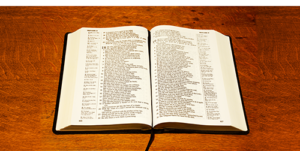Dr. McKellar’s Lesson for November 1, 2020
He Will Carry You!
Isaiah 46:1-13
1. Background
• fall of Babylon in Isaiah 46-48
• idolatry/collapse connection and the future security of God’s people
2. Carried gods (1-2)
• carried as burdens on weary beasts
• carried with their worshipers into captivity
3. Carrying God (3-4)
• command and commitment
• a striking contrast
• comprehensive coverage: from womb to tomb
4. Made gods: burdens void of saving power (5-7)
• clarifying question
• made by human hands: immobile, inarticulate, incompetent
5. The Making God (8-11)
• confrontational command
• declarative rebuke (47:8-10)
• declaring…saying…calling…
6. The Saving God (12-13)
• provision of righteousness for those far from it
• conformity to the will of God
7. So what?
• Because carried gods lead only to collapse, trust the God who carries you.
• “What we revere, we resemble; either for our ruin or restoration.” (Beale)
• “His love, in time past, forbids me to think He’ll leave me at last in trouble to sink: Each sweet Ebenezer I have in review confirms His good pleasure to help me quite through.” (Newton)
• “When man carries his god, the end is destruction; when the true God carries man, the end is salvation.” (Young)
• connection to Christ: 2 Thess. 3:5
Dr. McKellar’s Lesson for October 25, 2020
Unwearied Help for the Weary
Isaiah 40:27-31
1. Background
• impending Babylonian Captivity (Isa. 39:6)
• worse before it gets better
• comfort, word and greatness of God (40:1-26)
2. A Questioning Despondency (27)
• God’s knowledge
• God’s care
• legal case of pessimistic pilgrims
3. A Theological Reminder (28-29)
• formula repetition
• everlasting
• unwearied
• unfathomable
4. An Experiential Challenge (30-31)
• patient expectancy
• sovereign enablement
• as if people grow wings
5. So What?
• Proper thinking about God enables proper waiting on God.
• “…Understand that love, revealed on the cross, does not exclude but must always include suffering.” (Elliot)
• “Your thoughts of God are too human.” (Luther to Erasmus)
• NT connection: Matt. 11:28-30
• “He bids weary travelers rest in His house.” (Thomas)
Dr. McKellar’s Lesson for October 18, 2020
Holding Fast to the Lord
Isaiah 37:1-38
1. Background considerations
• Assyrian threat to Judah
• Hezekiah: “Yahweh strengthens”
2. Hezekiah responds to a national crisis (1-13)
• taunts of Sennacherib 36:1-22
• responding to arrogance with humility
• acknowledgment of utter helplessness
• prophecy of Isaiah and “remnant” repetition
• Sennacherib takes a parting shot
3. Hezekiah’s prayer for deliverance (14-20)
• “…spread it before the LORD.”
• adoration
• petition
• concern for the glory of God
4. Sennacherib’s fall (21-38)
• contrast between Sennacherib (v.3) and the LORD (v. 5)
• steps sequenced by the LORD
• a hook for the nose and a bit for the mouth
• 185,000 struck down
5. So What?
• Because the LORD always acts in the best interest of those who abandon themselves to Him, keep on holding fast to Him.
• Weave what you know of the LORD’S character into your worship.
• Speak to the LORD and expect to hear from Him.
• “And the widows of Ashur are loud in their wail, and the idols are broke in the temple of Baal; And the might of the Gentile, unsmote by the sword, hath melted like snow in the glance of the Lord.” (Byron)
• “For my life He bled and died, Christ will hold me fast; Justice has been satisfied; He will hold me fast. Raised with Him to endless life, He will hold me fast, ‘till our faith is turned to sight, when He comes at last.’” (Getty)
Dr. McKellar’s Lesson for October 11, 2020
The Non-Egyptian Protection Plan
Isaiah 31:1-9
1. Background
• fifth in a series of woes
• consideration of the extent of God’s power and control
• Judah in the midst of its Assyrian Crisis
2. The disaster of depending on Egypt 1-3
• warning against an existing dependence (Psa. 20:7)
• reliance rooted in settled attitudes
• the God who does not “take it back”
• the folly of trusting Egypt rather than the LORD (John 4:24)
3. The defense of dependence on the LORD 4-5
• growling lion of conquering sovereignty
• hovering bird of gentle protection (1 Cor. 1:25)
• sufficient and surrounding help
4. The invitation to depend on the LORD 6-9
• from revolt to repentance
• the ditching of idols
• the LORD “passes over” and the Assyrians “pass off” (2 Kings 19:35)
5. So What?
• Because only God can help you, look to Him.
• connection to Christ: A King will reign in righteousness (see Isa. 32!)
• “The blood of the lamb might have seemed ineffectual and irrelevant to a people under sentence of death but it was enough! So, against the unwisdom of Judah, the pretenses of Egypt and the threats of Assyria, the hovering God will prove His sovereign strength.” (Motyer)
• “All the king’s horses and all the king’s men…”
Dr. McKellar’s Lesson for October 4, 2020
A Case of Well-Placed Confidence
Isaiah 25:1-12
1. Testimony of Past Plans (1-5)
• Yahweh…Elohim
• declaration
• explanation
• elaboration
• checklist of faithfulness
• revered by the “ruthless”
• subdued noise
2. Anticipation of Future Celebration (6-12)
• “on this mountain…”
• inclusive provision
• veil removal
• death swallowing
• extinction of mourning
• waiting on the God who saves
• God’s presence and pride’s absence
3. So What?
• Knowing that you are engaged in a cause that will triumph in the end, persevere in hope.
• NT connections: I Cor. 15:55-58 and Rev. 21:4
• “They are spinning ropes of sand, if they are trying to lift the world clear of its miseries and of its hunger, and are not presenting Jesus Christ.” (Maclaren)
• “Send us strength, oh, Pilgrim Guide, sin would drown us in its tide, be close at hand and go before, as we sail to heaven’s shore.” (Nelson/McHugh)
Dr. McKellar’s Lesson for September 27, 2020
How’s That Working out for You?
Isaiah 23:1-18
1. Background/Setting
• last in a series of judgments pronounced against the nations
• note the inclusion of Israel in the previous chapter
• a few facts about the Phoenicians
2. A poem of ruin (1-14)
• downfall of Tyre and Sidon
• representative of man’s attempts to live without God (Rev. 17-18)
• loss of commercial influence
• silence in contrast to the buzz
• the past as though it never happened
• losses: joy, peace, rest and security
3. A prediction of restoration (15-18)
• recovery after 70 years
• unflattering portrayal
• invincibly appropriated
• brought down and raised up
• making even the enemy a servant
4. So what?
• Because God is sovereign and you are accountable to Him, live for His glory now!
• Recognize that opposition to God’s reign is the ultimate exercise in futility. He always has the last word!
• Reject the foolishness of a presumed invulnerability.
• See the NT connection and the wideness of God’s mercy (Matt. 15:21-28)
• “There’s a wideness in God’s mercy, like the wideness of the sea; There’s a kindness in His justice, which is more than liberty.” (Faber)
• Revel in the sovereign grace of the LORD!
Dr. McKellar’s Lesson for September 20, 2020
The Savior in Your Distress
Isaiah 7:1-8:10
1. The setting of the Immanuel prophecy: judgment on unbelief 7:1-9
• Syria and Israel seek to form an anti-Assyrian alliance and Ahaz refuses to join
• Rezin and Pekah want to install a puppet king in place of Ahaz
• The LORD’S reputation: at stake in what happens to Ahaz
• how 2 Sam. 7 “hovers” over Isaiah 7: a promise made (2 Sam. 7:16; 23:3)
• encouragement through Isaiah and Shear-jashub: remnant concept
• Isaiah’s message: trust Yahweh
2. The tone of the Immanuel prophecy: exposure of true allegiance 7:10-25
• Yahweh offers Ahaz a “sign”
• response of Ahaz: unbelief
• Yahweh imposes a sign: Immanuel
• Ahaz’s savior: king of Assyria (2 Kings 16:7)
• prophetic detail: virgin birth
• Yahweh’s promise or Assyrian power?
3. The impact of the Immanuel prophecy: power of a promise kept 8:1-10
• focus on the believing remnant
• the message of an unusual name
• a case of ancient name-dropping
4. So what?
• In light of His precious promises and unlimited power, apply the promise of the LORD’S presence personally.
• connection to Christ and a son of David who believed (Matt. 1:18-25)
• “This is my anthem, this is my song, the theme of the stories I’ve heard for so long. God has been faithful, He will be again, his loving compassion, it knows no end. All I have need of, His hand will provide… He’s always been faithful to me. “ (Groves)
Dr. McKellar’s Lesson for September 13, 2020
Awe-Stricken Reverence
Isaiah 6:1-13
1. Vision of the Lord 1-7
• setting: year of Uzziah’s death
• sight of the Lord: seated, elevated, expansive
• sight and sound of seraphim: superlative use of “holy”
• sensation of shaking accompanied by smoke
• Isaiah’s response: from “low” to “woe”
• touched by an angel
2. Commission from the Lord 8-13
• the questioning voice
• Isaiah’s availability
• recognition of the Lord’s sovereignty
• prescribed message: what Isaiah is to say
• duration of the proclamation: how long Isaiah is to say it
• making sense of a stump
3. So what?
• The proper perspective of the Lord’s character facilitates worship and fuels faithfulness.
• connection to Christ: John 12:41
• Remember that the true King is enthroned and will remain so eternally.
• “Well for us if the passing of all that can pass drives us to Him who cannot pass, if the unchanging God stands out more clear, more near, more dear, because of change.” (Maclaren)
• “…His Sovereign majesty, may we in glory see, and to eternity love and adore.” (Wesley)
Dr. McKellar’s Lesson for September 6, 2020
Guest Speaker: Sherry Forester
The Secret of Contentment
Philippians 4:10-20
Contentment is possible when we rest in God’s sovereignty and rely on His strength.
I. PROVIDENCE OF GOD (4:10)
God sees/knows everything before it happens.
• Omniscient, all-seeing, all-knowing
• Psalm 139:16
God controls all things.
• Sovereign = supreme, independent, self-governing
• Jeremiah 29:11
God’s ways don’t always make sense.
• I know I’m supposed to let Jesus take the wheel, but when I do, He seems to enjoy off-roading!
• Isaiah 55:8
God controls circumstances for our good and His glory.
II. PEACE OF GOD (4:11-13)
• v.11 Paul learned to be content in all circumstances
• v.12-13 The secret to contentment is relying on God’s strength. We can’t always change our problems, but we can rely on God’s strength during our problems.
Difficult situations are opportunities to rely on God’s strength.
III. PROMISE OF GOD (4:14-20)
• v.14-16 Paul remembered how God had supplied his needs
• v.19 God promises to meet all our needs
• v.20 God is glorified when we trust Him to meet our needs
God can be trusted to meet all our needs.
“All I have needed your hand has provided. Great is your faithfulness Lord unto me.”
Dr. McKellar’s Lesson for August 30, 2020
Wisdom When Trials Come
James 1:1-8
1. Background
• NT wisdom literature
• original audience: persecuted, dispersed Jewish believers
• 54 imperative commands
• Wise believers can count trials as causes for joy when they understand God’s power over them and purpose behind them.
2. Count your trials as causes for joy (2-3)
• recognition of the nature of trials: certainty, contingency and variety
• reason for the command: knowing…testing…faith…produces endurance
• matter of perspective and not denial
3. Trust the processes of your trials (4)
• full effect of endurance
• the purpose/goal of maturity
4. Ask God for wisdom in the midst of your trials (5-8)
• if = since
• the generously giving God
• assurance of provision
• ask in faith
• don’t suppose
5. So What?
• Grasp the ultimate goal of wisdom: conformity to Christ to the glory of God.
• Trials tend to traumatize those who value present comfort/security over continual conformity to Christ
• If He is Lord over your experiences, He will not waste your experiences.
• “This is all my hope and peace: nothing but the blood of Jesus. This is all my righteousness: nothing but the blood of Jesus.” (Lowry)


